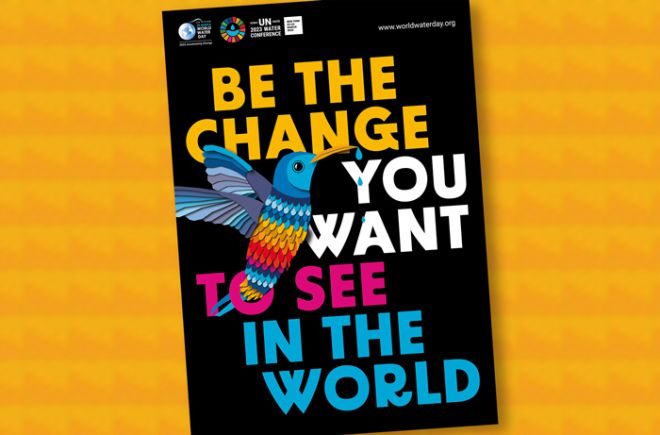World Water Day 2023: Accelerating Change to Meet SDGs by 2030
Published on January, 37 2023
by Jan Cordeman, Lib Hutchby, and Nancy Price
Earth Democracy Committee
February 2023
This year, the United Nations combined World Water Day (March 22nd) with World Toilet Day (November 19th) under the theme Accelerating Change to speed up achieving Sustainable Development Goal 6 – safely managed clean water and sanitation - by 2030.
World Water Day is explained as about accelerating change to solve the water and sanitation crisis, and because water affects everyone, we all need to take action. That means you! You and your family, school, and community can make a difference by changing the way you use, consume, and manage water in your lives.
Your commitment to do so will be added to the Water Action Agenda where you can register your commitment to be launched at the UN 2023 Water Conference, March 22-24, 2023, in New York. You may register a comment now and register for the conference here. This is the first event of its kind for nearly 50 years and is a once-in-a-generation moment for the world to unite around water. Play your part. Do what you can.
For World Toilet Day, November 19th, more information will be circulated later but here’s the information from 2022.
As the UN emphasizes, right now we are seriously off-track to meet SDG 6 –-water and sanitation for all by 2030. Billions of people and countless schools, businesses, healthcare centers, farms, and factories don’t have the safe water and toilets they need.
Let’s kick off preparations for a World Water Day March 22 and a World Toilet Day November 19 campaign with a listening exercise: “What does Accelerating Change” mean to you?
Basic Facts on the World’s Water-Related Ecosystems
The 2030 Agenda for Sustainable Development includes 17 goals and was adopted by the General Assembly in 2015. Significantly, the UN emphasized that these Goals required action by both developing and developed countries.
The basic facts below (from sdgs.un.org/goals) show the enormity of the global challenge – meeting drinking water, sanitation, and hygiene targets by 2030 requires a 4X increase in the pace of progress.
*The World’s Water-Related Ecosystems are being degraded at an alarming rate. For at least 3 billion people, the quality of the water they depend on is unknown due to a lack on monitoring. 733-plus million people live in countries with high and critical levels of water stress.
At current rates, in 2030:
- 1.6 billion people will lack safely managed drinking water.
- 2.8 billion people will lack safely managed sanitation; inadequate sanitation systems where open defecation allows for the spread of human waste into rivers, lakes and soil, contaminating water resources. Already in 2023, 3.6 billion people are still living with poor quality toilets that ruin their health and pollute their environment.
- 1.9 billion people will lack basic hand hygiene facilities.
Even if it were possible to achieve Goal 6 in seven years, it would take extraordinary planning by municipal, state, and national governments in both developed and developing countries and cost billions for new infrastructure from simple to complex projects by 2030.
As an example, in 2019 Food and Water Watch reported that in the US our water infrastructure is wearing out; water pipes under streets were built just after WW II, and every year there are 240,000 water main breaks wasting more than 2 trillion gallons of precious drinking water, while billions of gallons of untreated wastewater spill into waterways. Food and Water Watch estimated that in 2019 our drinking water and wastewater systems required at least $744 billion over the next 20 years, more than $35 billion a year, for essential repairs and new systems.
Now is the time for the US to strongly support SDG 6 and confirm that access to safe drinking water and sanitation are internationally recognized human rights derived from the right to an adequate standard of living under Article 11 (1) of the International Covenant on Economic, Social and Cultural Rights and fundamental to everyone's health, dignity and prosperity.



